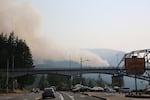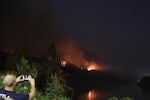
Smoke from the Eagle Creek Fire can be seen just past the Bridge of the Gods in Cascade Locks, Oregon.
Amelia Templeton / OPB
A human-caused wildfire in the Columbia River Gorge has forced many people in Cascade Locks to evacuate and could threaten additional towns and structures in the gorge, including Warrendale, Dodson and the Bonneville Dam.
Related: Eagle Creek Fire Still Threatens Cascade Locks, Growth Expected
The
Eagle Creek Fire burned more than 3,000 acres as of Sunday night
. The fire is burning along a popular hiking trail near the site of the oldest developed Forest Service campground in the United States, established at Eagle Creek in 1916.
Dozens of trails and three campgrounds in one of Oregon’s most popular hiking destinations are now closed for Labor Day. The closure area stretches from Ainsworth State Park to the Wyeth Campground.
Forest Service officials are urging recreationists to stick to the Washington side of the Gorge while they battle the blaze.
“Absolutely stay away from the vicinity of the fire,” said Rachel Pawlitz, with the Columbia River Gorge Scenic Area.
The fire was just a quarter-mile from the town of Cascade Locks Sunday evening.
Residents deliberating whether to evacuate gathered under the Bridge of the Gods and watched as the fire torched trees on the ridgeline to the south of Eagle Creek.
Officials with the Forest Service said 283 homes and businesses on the south side of Cascade Locks had evacuated, and people in the remaining 118 homes and business on the north side of town had been told to get ready to leave.
200 businesses and individuals remain at a Level 1, "get ready" status.
Around 6 p.m. Sunday, three airplanes dumped retardant on the fire, giving the small crowd hope that the blaze might stop before it reached Cascade Locks.
The Forest Service said the aircraft, known as fire bosses, were dumping retardant on a Bonneville Power line that runs from a substation in Cascade Locks to the Cascade Fish Hatchery at Eagle Creek. The power line had been de-energized, and firefighters hoped the buffer zone around the line, cleared of trees and brush, would serve as a suitable fire line.
“They’re dumping retardant on it in the hopes that will create a fire break that will protect the town of Cascade Locks,” said Pawlitz.
Firefighters with the Oregon Department of Forestry, Multnomah County, Wasco County, Hood River County, Washington's Skamania County had been dispatched to fight the fire. So far, they have focused on protecting structures rather than fire suppression.

A person snaps a cell phone photo of the Eagle Creek Fire, visible from the nearby town Cascade Locks.
Amelia Templeton / OPB
At the same time that its eastern flank threatened Cascade Locks, officials said the Eagle Creek Fire was pushing west. Shifting winds forecast for Monday could drive it farther into Multnomah County.
The Multnomah County Sheriff’s Office issued a Level 1 evacuation order for Warrendale, Dodson and the Bonneville Dam. Deputies were going door-to-door in those communities Sunday night, asking people with special needs to consider evacuating voluntarily. They also told people to prepare to move livestock and large animals.
Interactive Map: Wildfires In The Columbia River Gorge
“There’s still significant room between the fire and these communities, but obviously with winds shifting, it’s hot, it’s dry," said Multnomah County Sheriff's Office Lt. Chad Gaidos. "We expect the fire will move fairly rapidly when it does move."
Also Sunday, the Oregon State Police announced the fire was human-caused, likely sparked by fireworks. OSP said they have identified a suspect, but did not release further details.
Interstate 84 remains open, but the Forest Service is asking the public to be aware that a shutdown could happen any time.
Over the weekend, the Eagle Creek Fire was the backdrop for one of the most dramatic search and rescue operations in recent history. More than 150 hikers were on the Eagle Creek Trail when the fire started, and many were cut off from the trailhead as flames spread.
Former active duty Air Force medic and current reservist Rob Dones moved to Portland just a week ago. He was hiking to Punch Bowl Falls on a first date.
"We went to leave, and the whole entire trailhead, at the end, was covered in flames," he said.
Dones said he tried to scout a route around the wildfire, but it was impossible to pass.
“I've never seen anything like that before," he said. "The whole entire valley was just this wall of fire and smoke, you couldn’t see past it."
Eventually, a group of hikers gathered near Punch Bowl Falls, a popular swimming area.
They were able to call 911 and were told to hike out in the opposite direction, toward Wahtum Lake. But hiking in the dark proved treacherous, and the group spent the night sleeping outside near Tunnel Falls, with just a few sleeping bags among them.
In the morning, the hikers traveled to Wahtum Lake and were shuttled in yellow buses to meet their waiting family members.
A smaller group of three people was airlifted to safety by the Oregon National Guard on Saturday evening. Law enforcement said that group was in the most difficult location. Another group of 14 hikers was led to safety by Forest Service security personnel.
The stranded hikers Saturday night included 10 high school juniors from Salem, two families with children and a person hiking the Pacific Crest Trail. Two dogs were also rescued.
Some people had hiked to Punch Bowl Falls to swim for the day and were dressed only in swimsuits and flip flops.
"It was making sure everyone kept the momentum, kept walking," Dones said. "I tried keeping everyone calm."
As they stumbled off the yellow school buses Sunday, the hikers described surviving their unexpected night outside by sticking together and sharing food, including a single jar of peanut butter, and supplies like a water filter and extra clothing.

Eric Oftstie reunites with his wife Jenalee, 43; his son Ansel, 10; and their friend Heather Jeppesen.
Amelia Templeton / OPB
Ansel Ofstie, 10, said he thought he was going on a short hike to Punch Bowl Falls with his mom, Jenalee Ofstie, and her friend, Heather Jeppesen.
Ansel left the house wearing a dinosaur print T-shirt, Adidas sneakers and cotton socks.
His backpack held one granola bar, one pack of fruit snacks and two bottles of water. Enough for a quick snack break — but nowhere near what the trio would need for the overnight ordeal ahead.
"I got trapped in a forest fire," he said. "And that was not fun."
Ansel said one of the scariest moments happened around 10 p.m., when the group was preparing to sleep. Through the dark, he could see bright embers falling in the forest.
"There were embers throughout the forest that hadn't lit anything yet, but they could have started a fire," he said. "When we were getting prepared to sleep, this person climbed all the way down this huge hill, across a river, all the way with a jug of water and then put out the flame."
Ansel said he felt inspired by the kindness and bravery of the people who camped overnight with him.
"It was a unique experience," he said. "I hope I won't have to go through it again."
